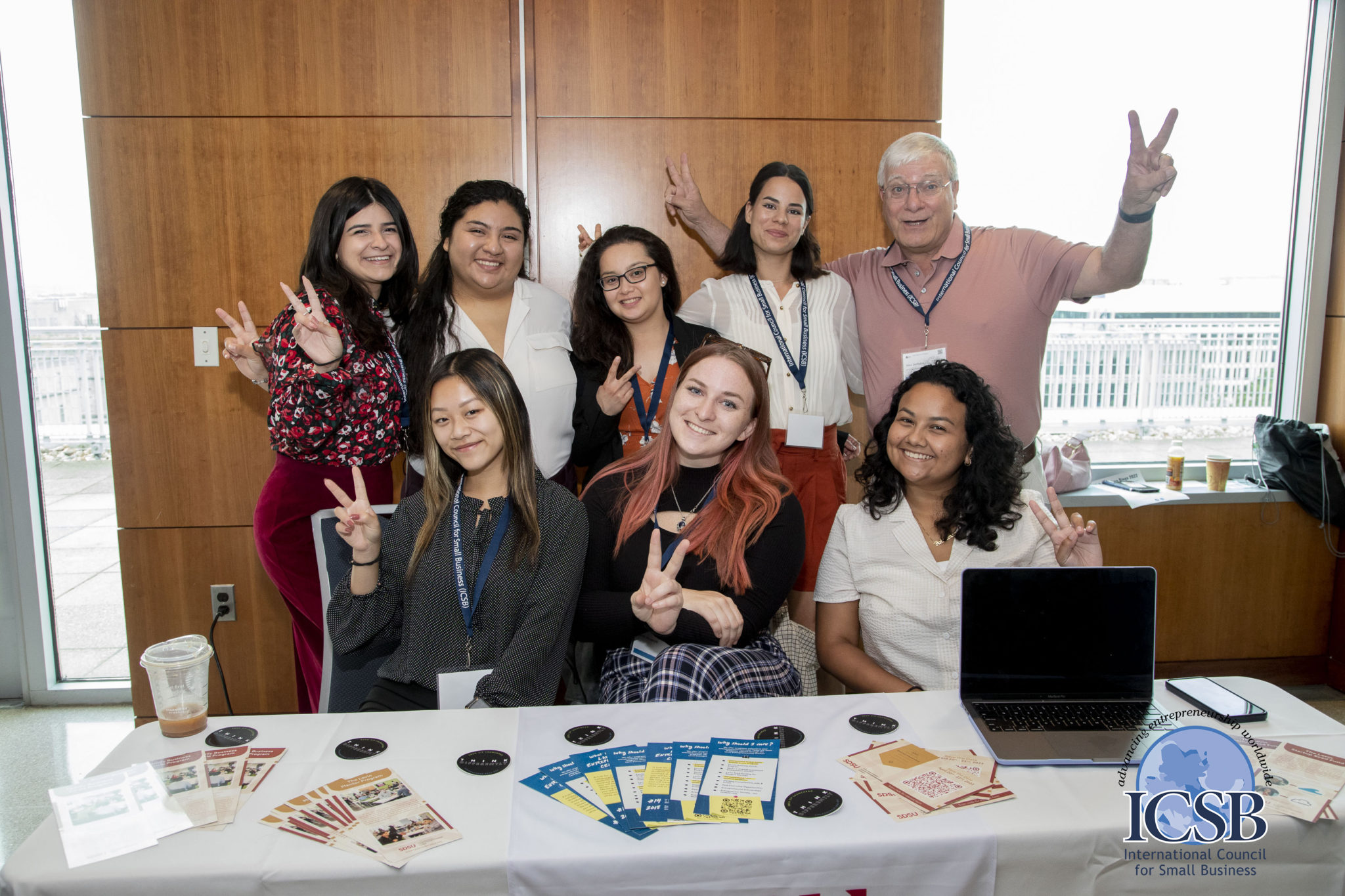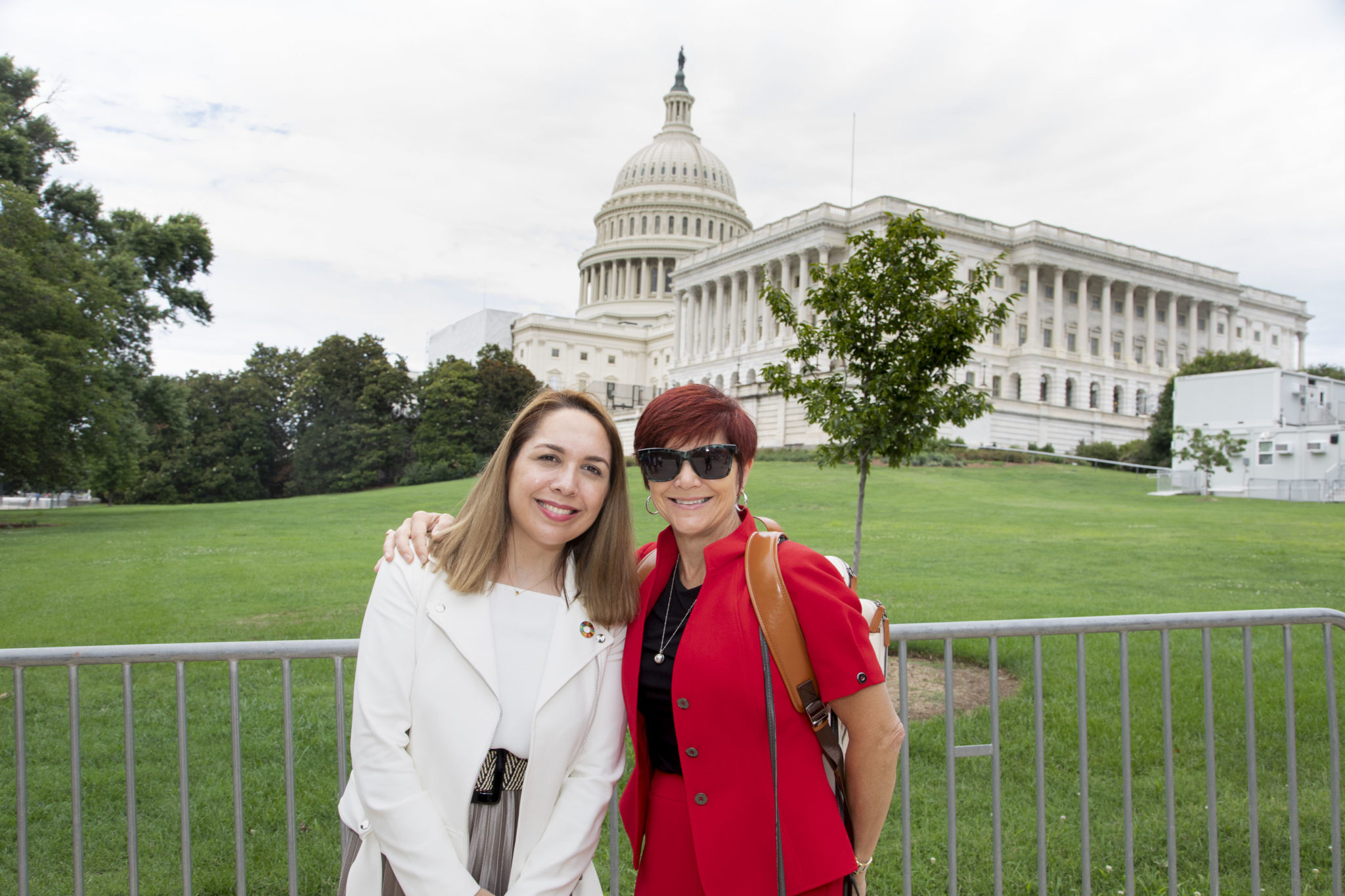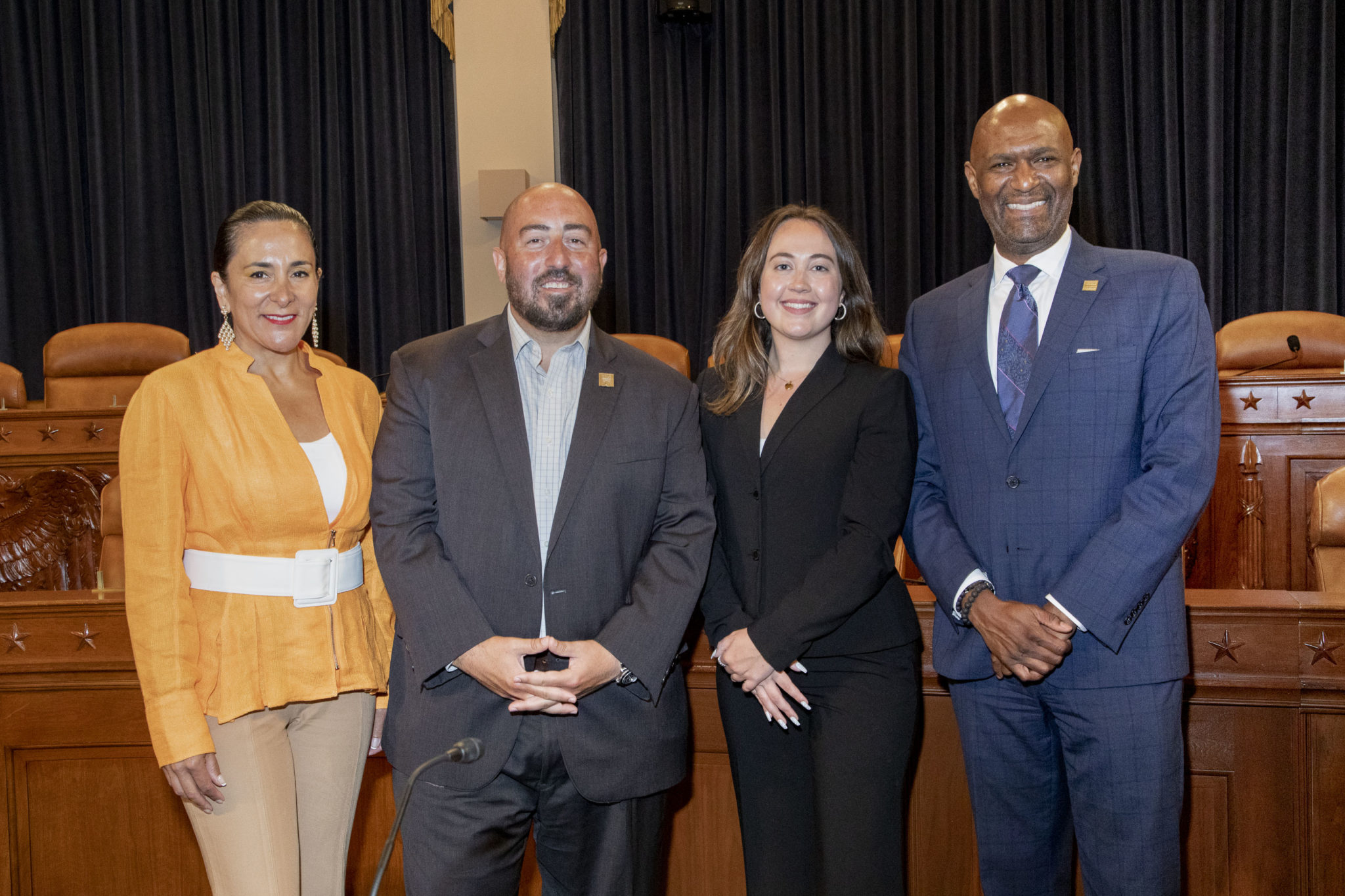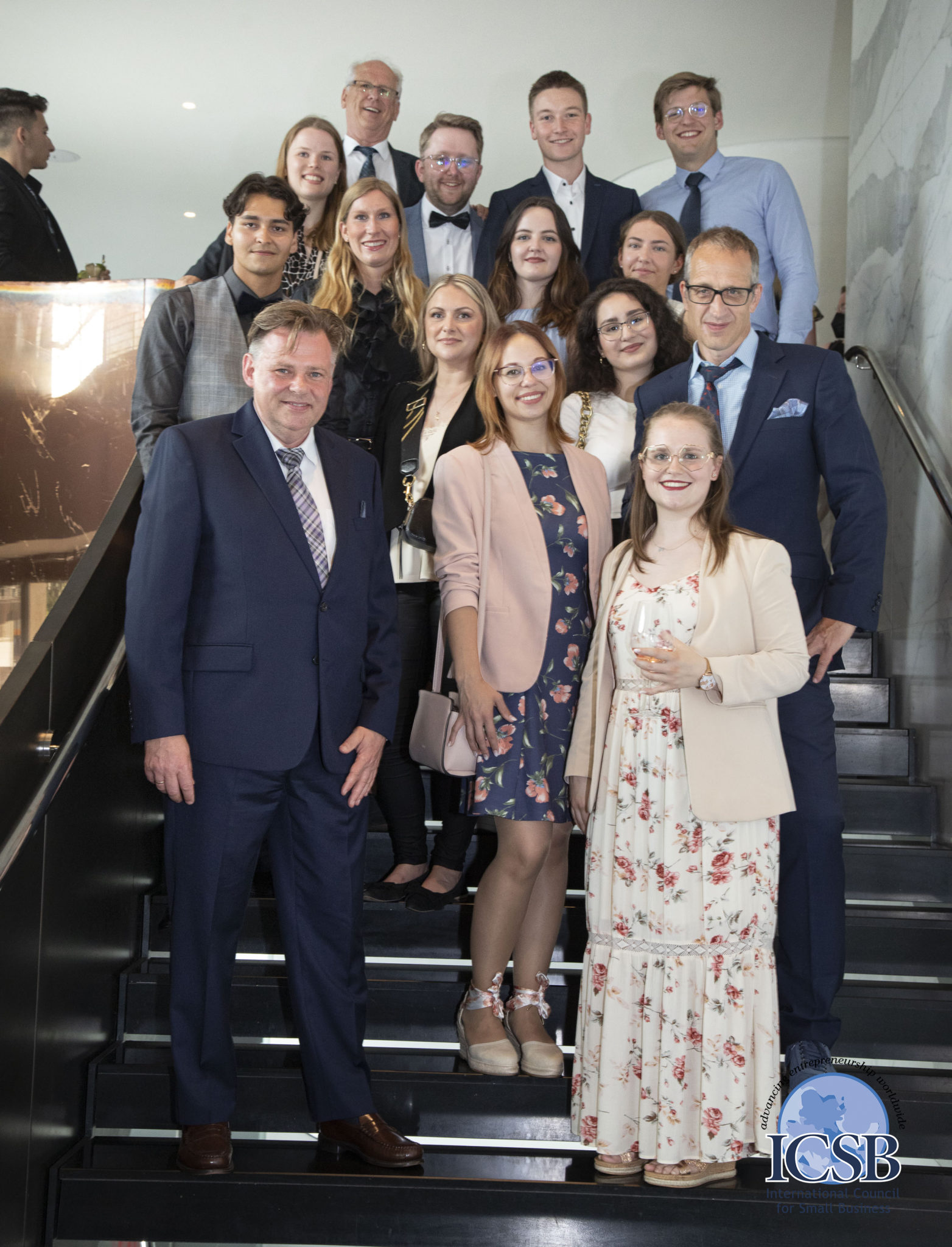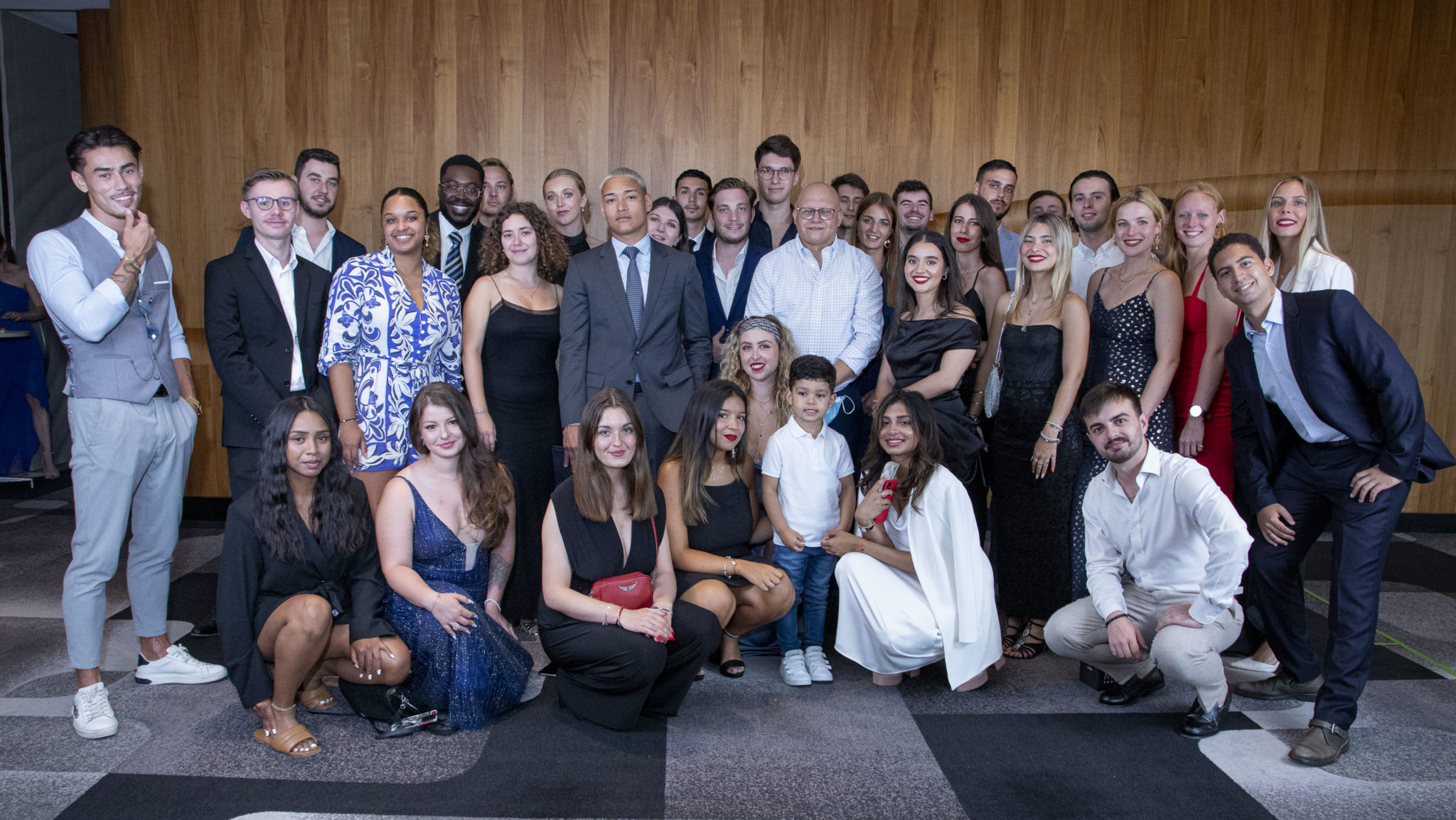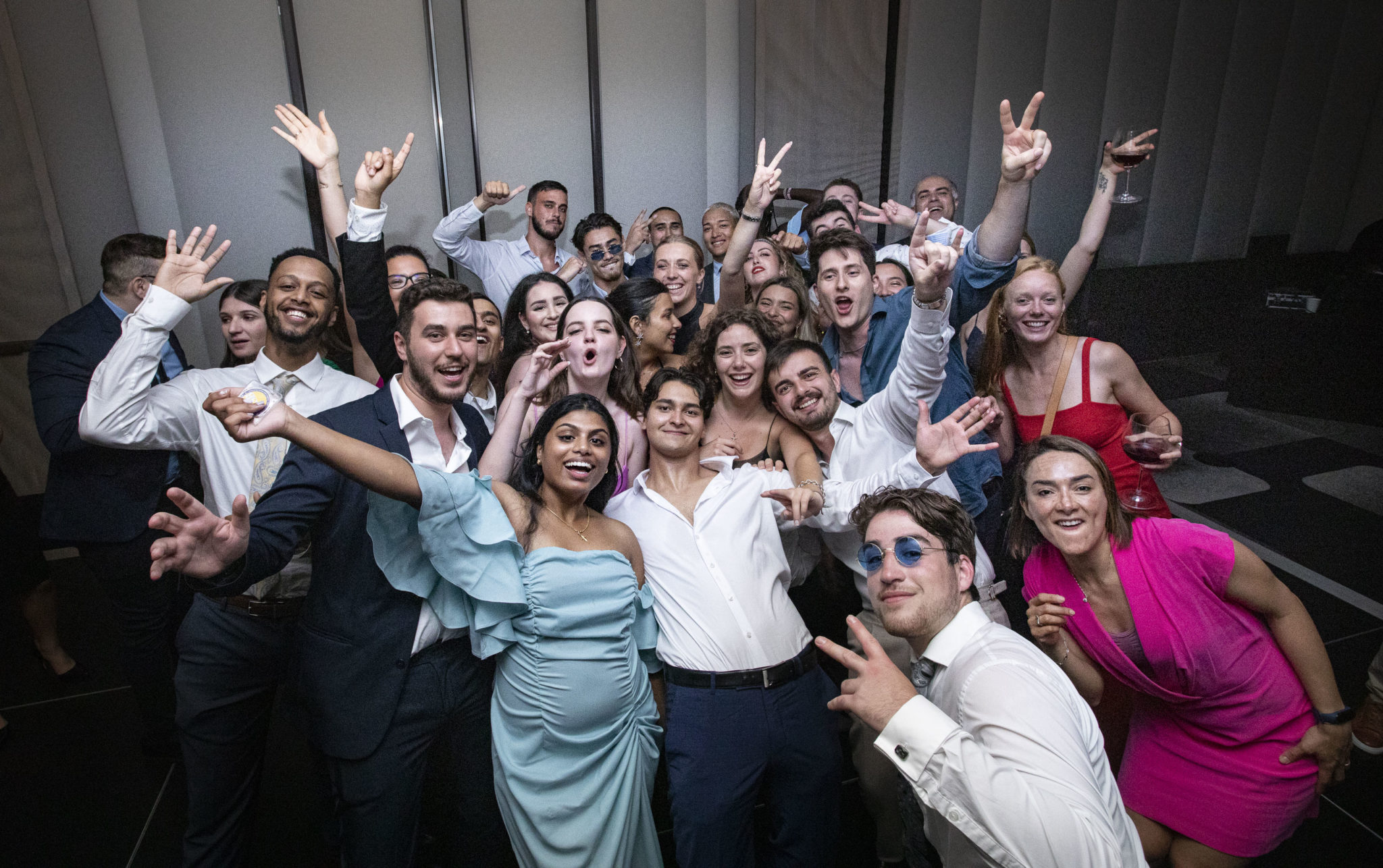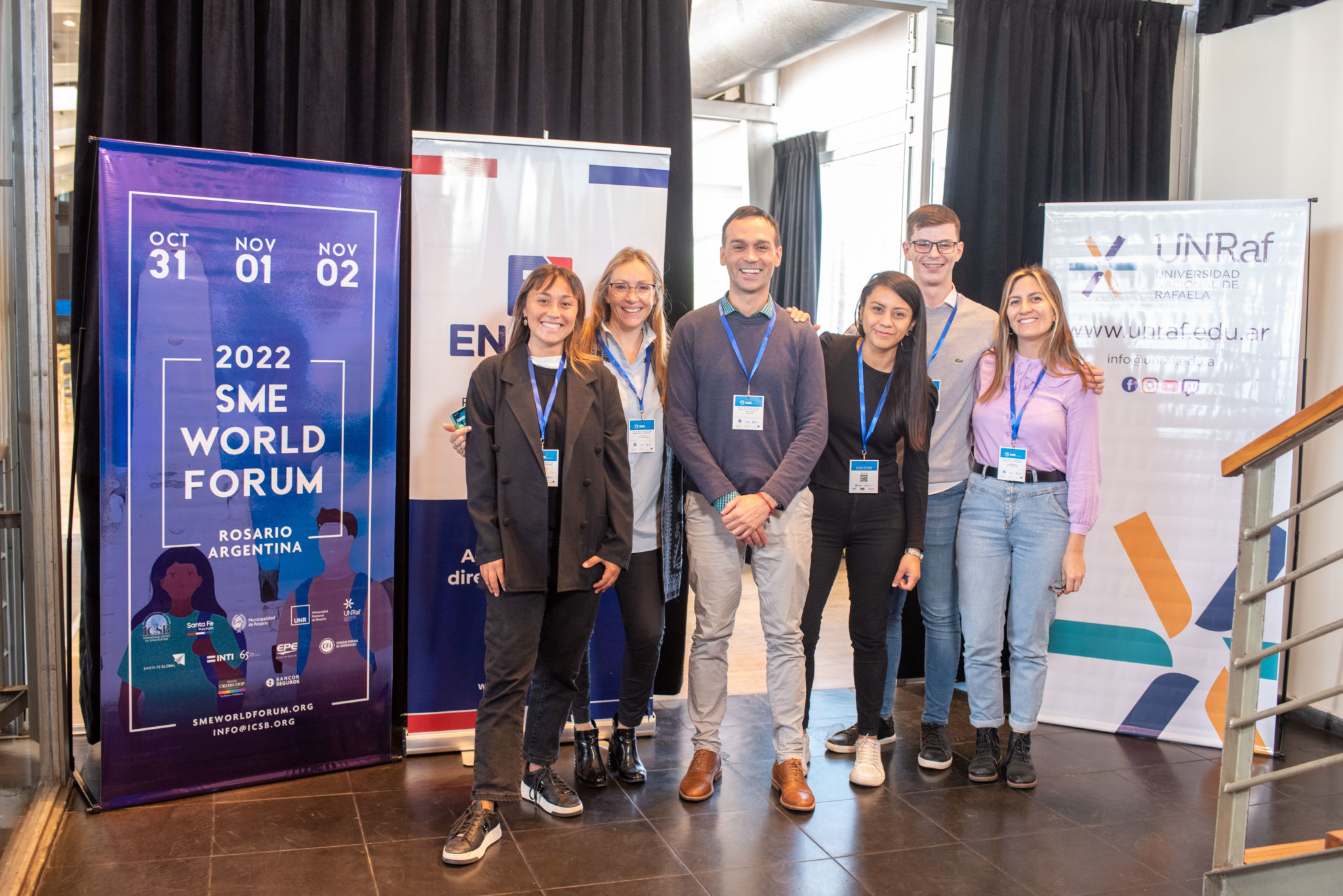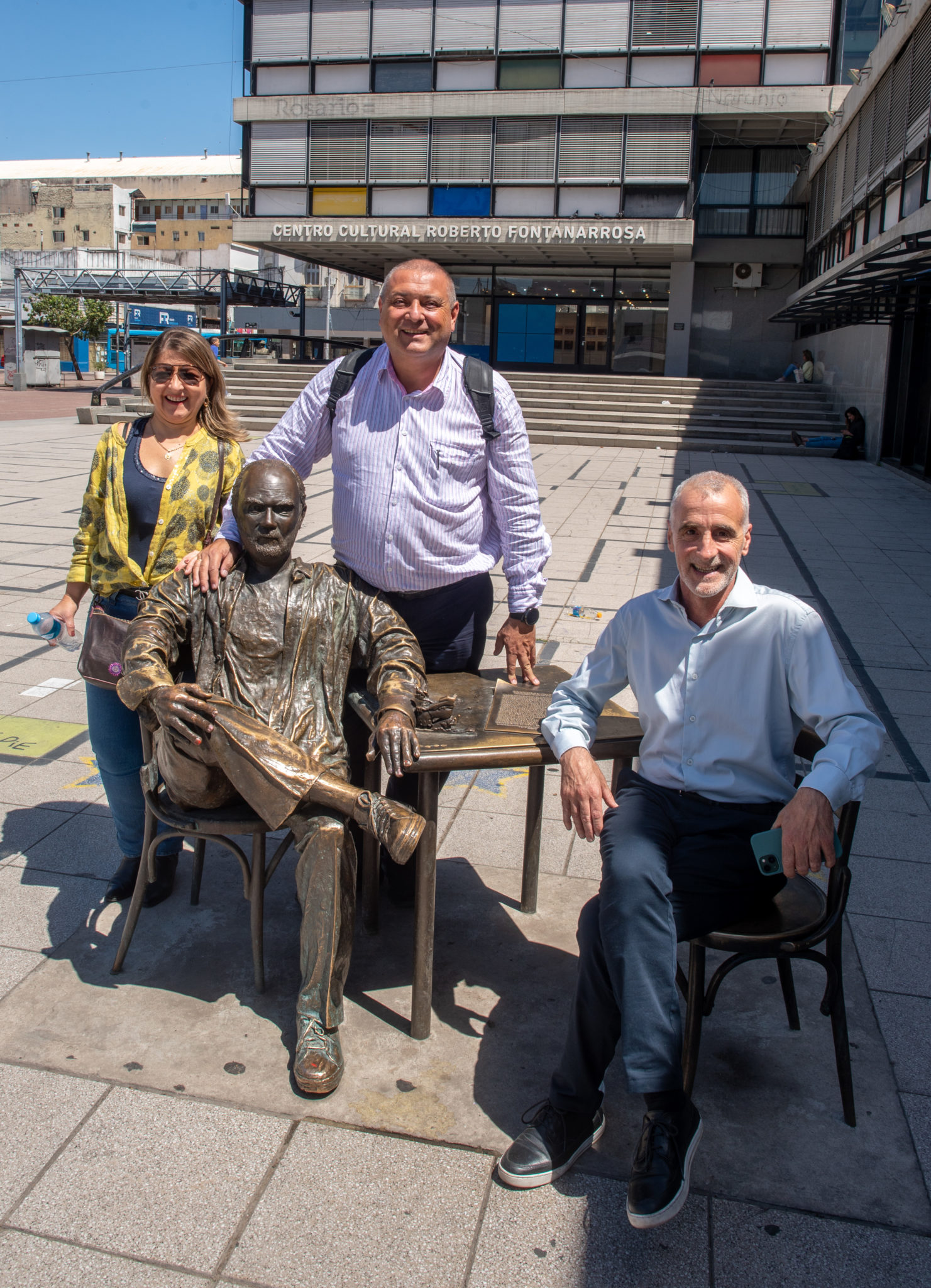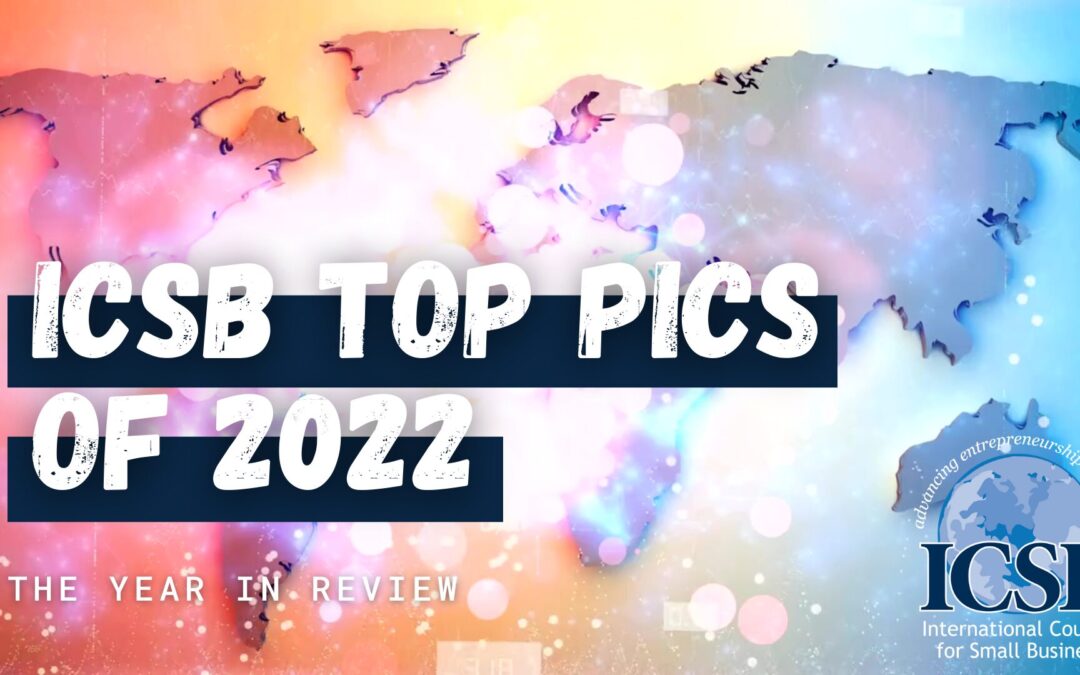

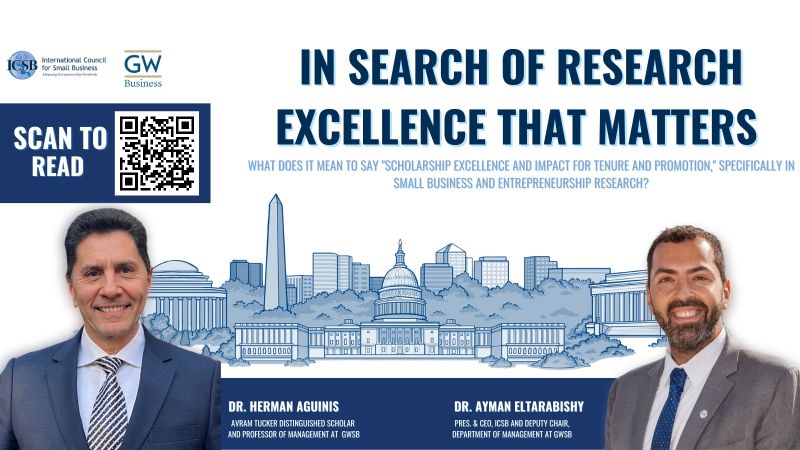
Research Excellence that Matters
Dec 13, 2022 | Ayman Site, News | 1, reflections, Small Business Horizon Site, SME World Forum Site, The Latest, World Congress Site

Research Excellence that Matters
Dr. Ayman ElTarabishy, President & CEO, International Council for Small Business Excellence, Deputy Chair, Department of Management at the George Washington University School of Business (GWSB).
and
Dr. Herman Aguinis is the Avram Tucker Distinguished Scholar and Professor of Management at the George Washington University School of Business (GWSB).
What does it mean to say “scholarship excellence and impact for tenure and promotion,” specifically in small business and entrepreneurship research?
Most universities use a combination of the following criteria to assess excellence in research:
- 1- Publications in high-quality journals,
- 2- Citation metrics, and
- 3- Impartial evaluations by recognized experts in the candidate’s field
Yet, there is no agreed-upon guidance on what “high-quality journals” are. As a result, junior faculty have often asked for advice on the definition of “high-quality journals.” Because of a lack of clear guidelines, many schools choose to use journal lists such as the UT-Dallas list or the FT-50 list. We all know this is a critical choice because it dictates decisions about tenure, promotion, and salary increases, as well as other important rewards such as teaching reductions, additional financial support in the form of summer salary, and research funds.
I asked Dr. Herman Aguinis, one of the leading experts in the world on scholarly impact who has been ranked among the world’s top 100 most influential Economics & Business researchers every year since 2018, to help shed light on these issues.
Dr. El Tarabishy: The UT-Dallas journal list seems to be used by many universities. Who created it?
Dr. Aguinis: I like reading history, so I looked into this issue a few years ago. Interestingly, this list was created in a study published in a 2000 Academy of Management Journal article. If you read this article closely, you will see that the authors defined “high-quality journals” based on which ones had the highest impact factors in the years 1995, 1996, and 1997. I am sure many business school deans have no idea they are imposing a list of journals based on citation data from the late 1990s. I don’t think we should use impact factor data from 25 years ago because many journals are no longer as impactful as they used to be. Others were very young at that time, but today are just as impactful or more compared to those on the list. Would you make decisions about valuing a car, a house, or anything else based on data that are a quarter of a century old? Probably not. So, I don’t think we should not value journals based on data that are a quarter of a century old, either.
Dr. El Tarabishy: How about the FT-50 list? This one is a lot more current, right?
Dr. Aguinis: Yes, it was created in 2016, and it was an update of the previous “UT-45” list that started in 2007 and then was updated in 2010. As its name indicates, this list was created by the Financial Times. The Financial Times compiled this list based on a journal reputation survey involving about 200 business schools participating in the FT Global MBA, Executive MBA, or Online MBA rankings. In addition, journalists at the Financial Times decided to drop some journals from the original FT-45 and add others to create the FT-50 list—but we don’t know the criteria used. I am not sure it is a good idea to assess the value of our research based on the opinion of journalists, especially when the criteria used to select journals are not sufficiently clear. I believe that many business school deans push faculty to publish in journals on this list because this positively impacts a business school’s FT ranking, which is an essential component of a dean’s performance evaluation. But, this does not mean that articles published in these journals are necessarily of higher quality or have a greater impact than those in other journals. I can see why many deans promote the use of this list based on their own self-interest, though.
Dr. El Tarabishy: Regardless of specific lists, is there any value in having them? Or should we eliminate them?
Dr. Aguinis: This question needs to be answered within the strategic goals of each specific business school. First, if there are no research standards whatsoever, a list may be useful. Also, having a list protects junior faculty who have published a sufficient number of articles in journals on the list when they go through the tenure review against vague reviewer statements such as “this research is not of sufficient quality to merit tenure.” On the other hand, pushing faculty to publish in a small number of journals only “by all means necessary” creates problems because faculty, who are very smart, will obviously be highly motivated to find ways to publish in those journals. This changes the goal from making important research contributions that will produce meaningful and important improvements in society to just “getting another hit.” We discussed pros and cons of journal lists in detail in our Academy of Management Perspectives article “An A is an A:” The new bottom line for valuing academic research.
Dr. El Tarabishy: Many schools have moved away from lists and use journals’ impact factors to decide whether a specific article is impactful. What are your thoughts on this practice of evaluating research?
Dr. Aguinis: The impact factor is the average number of citations received by articles in a journal based on a particular time window. So, it is a measure of average citations for each journal. In other words, it is a journal-level measure of impact, not an article-level measure. A small minority of articles published in top journals account for the lion’s share of those journals’ citations. Most articles in leading journals are cited just as often, if not fewer, than those published in journals not considered “top” journals. We make too many mistakes when we confuse the journal and article levels of analysis. We collected quite a bit of data that supports this conclusion empirically in our Academy of Management Learning and Education article titled Defining, measuring, and rewarding scholarly impact: Mind the level of analysis. Also, you can watch this 5-minute video explaining these issues as well.
Dr. El Tarabishy: What is your advice for those of us interested in improving the impact of our research?
Dr. Aguinis: In thinking about the impact of our research, we need to consider the broader impact of our work across multiple stakeholders: Other researchers, students, and society at large. Fortunately, university administrators including deans and department chairs and we, researchers, have several tools to do just that. These are tools derived from the performance management and talent management literature. We described many of these in our 2021 article titled How to enhance scholarly impact: Recommendations for university administrators, researchers, and educators.
Dr. El Tarabishy: Any final thoughts you would like to share with us?
Dr. Aguinis: Scholarly impact is a journey—not a destination. We need to careful think about impact before, during, and after our research is completed. We need to ask questions such as: Who are we trying to benefit from our research, and why? What can I do to improve the impact of my research in the future? How can I make my research more relevant and valuable for society? If you are interested in answering these and other related questions, please see our Business & Society article titled If you are serious about impact, create a personal impact development plan.
Dr. El Tarabishy: Thank you for sharing your insights with us!
Dr. Aguinis: You are most welcome. Thank you for the opportunity to talk about these issues, which I believe are critical for the success and long-term sustainability of business schools.
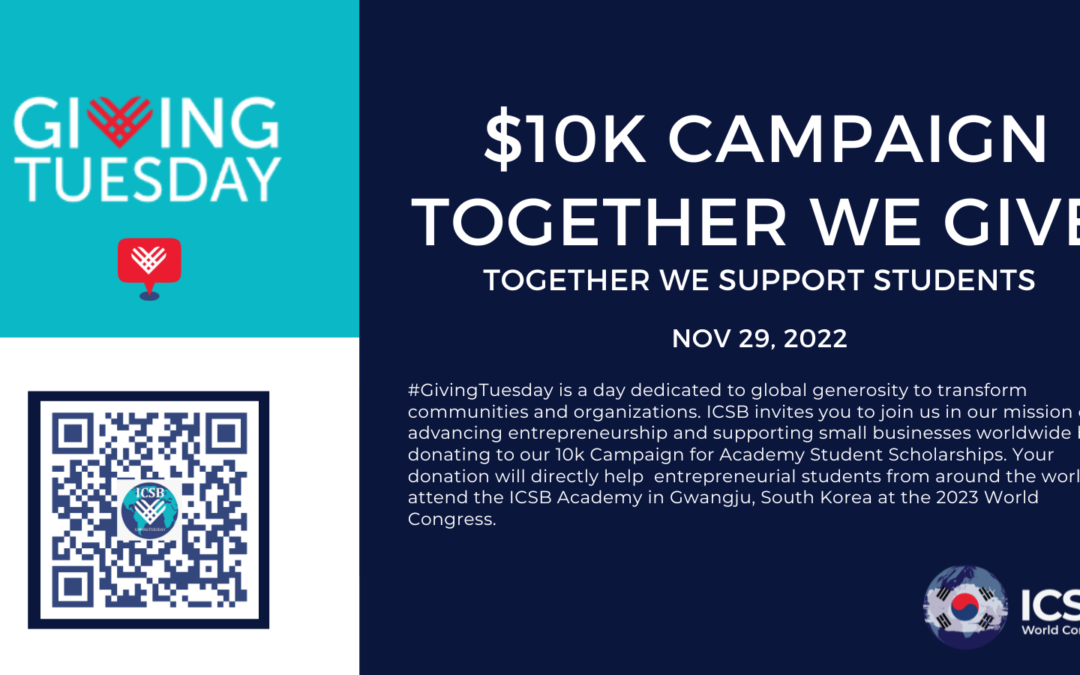
GivingTuesday2022
Nov 27, 2022 | News | 1, The Latest
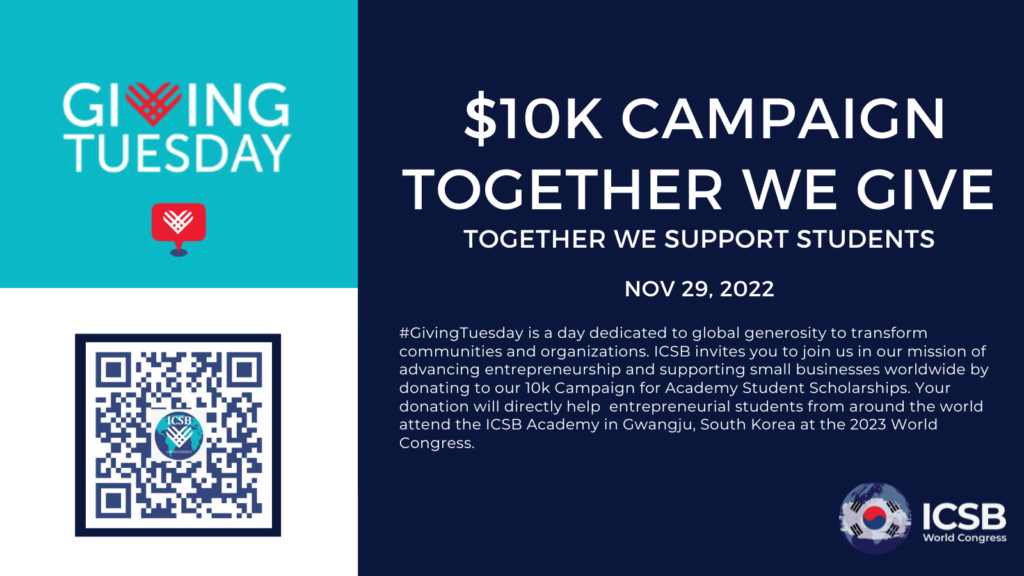
Support our Student with Global Scholarships
#GivingTuesday is a day dedicated to global generosity to transform communities and organizations. ICSB invites you to join us in advancing entrepreneurship and supporting small businesses worldwide by donating to our 10k Campaign for Academy Student Scholarships. Your donation will help entrepreneurial students worldwide attend the ICSB Academy in Gwangju, South Korea, at the 2023 World Congress. We are investing in our most incredible resources, the entrepreneurial students that want to attend our premier global event.
Your contribution will help secure scholarships to attend a week of cutting-edge presentations from our global experts. They will visit notable companies, work on projects confronting global challenges, and present to our World Congress attendees.
There has never been a more critical time for your support to our students and small business community when so many are threatened financially by the global pandemic.
We will award our students scholarships and provide our sponsors with a global certificate and recognition at the ICSB World Congress.
Despite the changing times, our purpose remains the same: to be devoted to the interests and advancement of small businesses globally. Your support on this GivingTuesday will help us to be the premier global platform in consent of Small and Medium-sized Enterprises and help these vital institutions continue to grow and thrive in our communities.
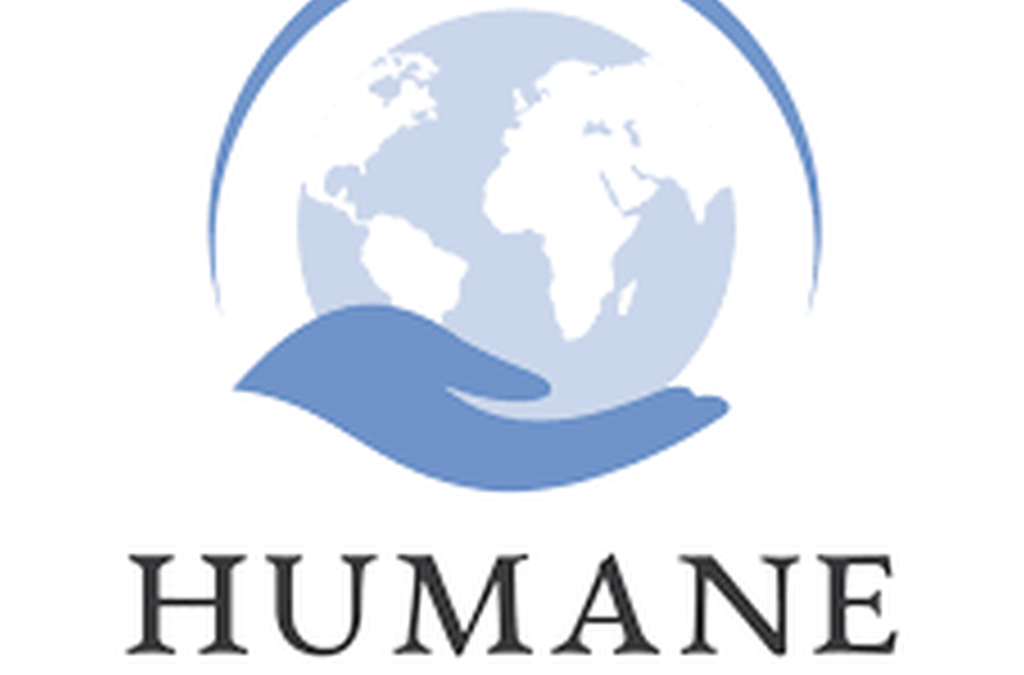
Humane Entrepreneurship
Nov 23, 2022 | Ayman Site, News | 1, reflections, Small Business Horizon Site, SME World Forum Site, The Latest, World Congress Site

Humane Entrepreneurship and Small Businesses
Consumers are starting to recognize the value of being able to expend their resources while concurrently awakening to the troubles that small businesses globally face. As for businesses, many have also reflected on their values and practices, deciding where to make cuts and how to demonstrate employee value. At large, we have all been influenced by this global reset.
This re-establishment places many in the space of simultaneous suffering and structuring. This is where the principles of humane entrepreneurship can be applied in practice. Detailed in their original publication, humane enterprises share four categorizations for business, those being ideal, moderate, negative, and harmful. Working as types of standards for the business community, these qualify businesses not only in their transition towards just practices but also in their ability to apply these grades of practice as individuals and through cultural business diffusion.
Ideal Humane Entrepreneurship can be found in companies where their top management and administration embody the cultural values of empathy, equity, empowerment, and enablement for their employees. As the leadership guides appropriately and humanely, a culture of these values will help generate innovation, appropriate risk-taking, and decisive actions that produce activities creating quality job creation and company wealth, which helps continue the cycle of these qualities. Although these qualifiers need markers to measure these standards, companies might create evaluation and assessment phases to calculate their business’s standard of Humane Entrepreneurship. Additionally, national leaders can use these principles as they reconsider current policies surrounding enterprises, aiding in the need to bring a Culture of Ideal Humane Entrepreneurship to the forefront of both consumers’ and producers’ understanding of their role in entrepreneurship.
Moderate Humane Entrepreneurship can be portrayed in companies where leadership is committed to one aspect of generating a Culture of Humane Entrepreneurship. This will inevitably lead to an imbalance between managing the human and strategy within the organization. Resulting in varied outcomes for wealth and job creation, this cycle will, unfortunately, not continue the cycle of positive performance seen in the Ideal standard.
Regrettably, negative Humane Entrepreneurship is depicted in many companies worldwide, where the organization’s leadership forgets the importance of the “human” component to entrepreneurial orientation. This will thus create dissatisfaction among employees and disempower high-level performance, innovation, and risk-taking. This sterile ecosystem will cause depletion and discontinuation of wealth cycles. There remains the possibility for an organization of this Negative nature to recover the humane element of the business.
Lastly, Harmful Humane Entrepreneurship is seen in leaders who purposely and directly harm their employees and, thus, the capital. The Culture of Humane Entrepreneurship is not visible in this environment, leading to a decline in performance and wealth, which is often impossible to resolve and look forward to.
Humane Entrepreneurship necessitates that companies either transition immediately or begin their business plan based on a humane orientation to entrepreneurship, allowing leadership and staff to understand their value while working as a cohesive team. This company will demonstrate its belief that “respect for human dignity demands respect for human freedom,” thus leveraging its company to further the ideals of empathy and equity beyond the walls of its business to broadcast this Cultural value to and for the greater world.
Article by: Dr. Ayman ElTarabishy, President and CEO, ICSB

9th Georges Doriot Days – Entrepreneurship and Society
Nov 22, 2022 | Ayman Site, News | 1, reflections, Small Business Horizon Site, SME World Forum Site, The Latest, World Congress Site

9th Georges Doriot Days - “Gender perspectives in entrepreneurship : Sharing views about societal challenges”
July 5-7, 2023 at UQAM’s School of Management campus in downtown Montreal
The Georges Doriot Days : Why?
Every two years, the Georges Doriot Days are an opportunity to put three strong principles into practice:
– Practical intelligence: entrepreneurship is a field where interweaving academic thinking and practices is necessary and fruitful.
– A transdisciplinary vocation: the Doriot days make it possible to approach entrepreneurial phenomena from various lenses: managerial, legal, psychological, historical, etc. In addition to management sciences, the Doriot Days are open to experts in economics, legal sciences, cognitive sciences and more broadly, in humanities and social sciences.
– The relationship between entrepreneurship and society: the Doriot days wish to put emphasis on entrepreneurship as an agent of social transformation, not reducing it to the mere creation of wealth.

Digital Reality
Nov 18, 2022 | Ayman Site, News | 1, reflections, Small Business Horizon Site, SME World Forum Site, The Latest, World Congress Site

If you ask the average entrepreneur what lessons or skills they have learned and developed over the past year, one answer comes up again: ZOOM (a.k.a. flexibility.) There is no flexibility in the modern business world without a digital presence. The tools exist for small businesses to create an online, global platform that can work towards various societal needs with very few input resources. The future of education is digital, and tying your business’s investment in digital presence to skills training or other educational opportunities is a brilliant, cost-effective way of growing your footprint.
COVID-19 and the resulting changes to the day-to-day operations of millions of people worldwide have accelerated this shift toward digital infrastructure and technological competency. At ICSB, we believe that this transition to a more global and digitally connected environment provides opportunities for all small and medium-sized enterprises (SMEs) and sustainable entrepreneurs to increase their knowledge and to network through a collection of digital conferences.
We want to emphasize that while the potential value of digital conferences and the broader expansion of technological advancement, in-person meetings, and opportunities to meet and socialize remain the ideal for a robust exchange of information and perspectives. However, in a world that continually asks us to adapt, we must continue to be ready to do so.
One of the main attractions of a digital conference is location neutrality. Conferences can be hosted from wherever, and it becomes exponentially easier for distant parties to attend events that would ordinarily have been very difficult in regular times. This approach also centers on disabled actors and other parties that require a different set of accommodations. When we say we want to build a more equitable and just world, these are some of the more minor, more complicated things we must pay attention to.
Additionally, a digital conference’s environmental impact is a fraction of the average ecological costs of long-distance travel and other amenities of an in-person function. We must emphasize sustainability and consider expenses that we have historically ignored.
While this age of digital conferences and events is relatively new, there are ways to maximize your event’s effectiveness. As Lawton (2020) writes, some of the key considerations include:
- Timetabling of speakers should be optimized to account for the different time zones in which speakers and participants are located.
- Presenters should be taught how to use the software before the conference, including optimizing their environment, lighting, positioning, and digital broadcast clothing.
- Audience participation via asking questions and voting in polls is essential to keep the audience engaged and scrutinizing presented material.
- Technological failures are distracting and time-consuming. A dedicated team should be assigned to troubleshoot and make contingency plans when the issue cannot be resolved.
- Decide how recorded content will be made available and whether this will be restricted to registered participants or open to a broader audience.
The details will change according to the specifics of certain events. Still, we believe a foundation emphasizing preparedness, audience engagement, and technological competency is a definite beginning as we evolve our practices to meet the times’ challenges. Additionally, we believe incorporating these strategies will create a special and unique experience that does not merely look to replicate the features of a traditional, in-person event. Digital conferences and circumstances are individual and offer their pros and cons.
We believe we must lean into these challenges if we want to continue to succeed.
Article by: Dr. Ayman ElTarabishy, President and CEO, ICSB

The Future of Entrepreneurship Education
Nov 11, 2022 | Ayman Site, News | 1, reflections, Small Business Horizon Site, SME World Forum Site, The Latest, World Congress Site

Entrepreneurship Education sits as the cornerstone of creating socially and environmentally conscious entrepreneurs. When we imagine the future of humane entrepreneurship, it includes empowered employees and well-educated entrepreneurs making intelligent decisions to heal the environment and benefit the world. To enable entrepreneurs to make these changes we envision, we must educate them on the issues that truly matter, such as integrating social entrepreneurship with sustainable entrepreneurship and employing business practices that protect our planet, communities, and future generations.
First, we must consider the significance of climate change and the role that government officials and entrepreneurs play in preventing further damage to the planet. Although governments are making changes to reduce negative environmental impacts, we are still concerned about whether profitability and sustainability coexist. We must educate all stakeholders about climate risk and their duty to promote sustainability in response to this. As observed by Dr. Mariya Yesseleva-Pionka, Global Certificates Manager for ICSB and adjunct professor at the University of Technology Sydney, “With every new business venture comes a great responsibility for making climate-friendly decisions.” Therefore, we must continue developing and supporting eco-friendly solutions such as green start-ups, fin-techs, and sustainability reporting and educate entrepreneurs on properly implementing SDGs and sustainable business practices. It is imperative to note that long-term profits will not matter if the planet deteriorates due to climate change.
This sustainability education is inherently tied to education about social entrepreneurship, as both of these entrepreneurial approaches target issues on a human and environmental level. Although there exists an increasing amount of research on social entrepreneurial intention (SEI), or the motivation of entrepreneurs to build new social enterprises, we still lack knowledge about different SEI antecedents, such as personality, cognition, and experience, as well as variables moderating antecedent-SEI relationships, including economic and social influences. According to Dr. Phillipp Kruse, a scientific staff member at the Dresden University of Technology, the solution to these research issues lies in examining SEI in countries with different cultures and economic situations and developing a validated instrument with which to measure SEI. Additionally, social entrepreneurship educators must include more psychological input in university courses to strengthen participants’ motivational ties to social entrepreneurship.
With entrepreneurial learners’ power to change the future of business and the environment, we owe them the best education, educators, research, and settings. We must listen inclusively to these learners’ and new and small businesses’ voices. Dr. Norris Krueger, the Senior Research Fellow at the College of Doctoral Studies, UOPX & Entrepreneurship Northwest, stated, “Students are our secret weapon. In terms of learning and educating, especially in the ecosystem.” To provide entrepreneurial learners with the best resources, we must shift from top-down systems to bottom-up, from institutions to people, and from hierarchies to networks. Inclusivity and active listening are the keys to discovering what our entrepreneurial students need to flourish, improve their communities, and shape the future of humane entrepreneurship. In educating entrepreneurs and stakeholders on their sustainable responsibilities, increasing students’ ties to social entrepreneurship at the university level, and providing high-quality, comprehensive education, we grant entrepreneurs the tools necessary to implement safer business practices and create long-term, positive change for our environment, communities, and ways of life.
Article by: Dr. Ayman ElTarabishy, President and CEO, ICSB
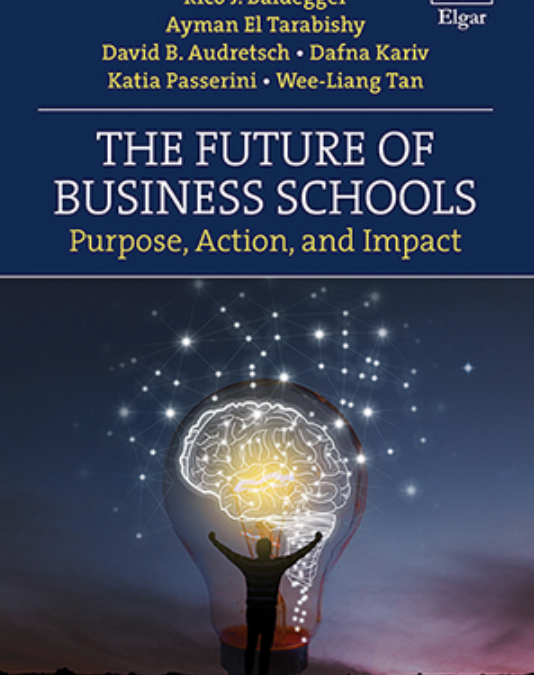
The Future of Business Schools
Nov 7, 2022 | News | 1, The Latest
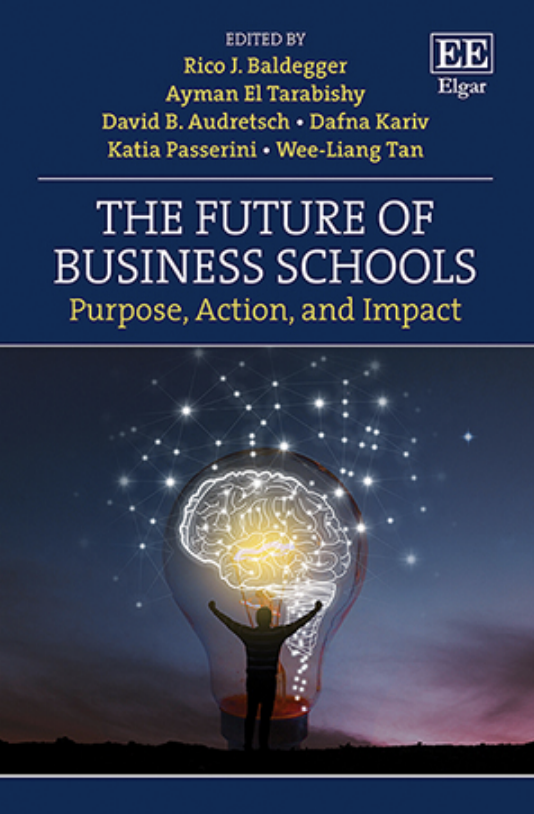
Are business schools on the wrong track? For many years, business schools enjoyed rising enrollments, positive media attention, and growing prestige in the business world. However, due to the disruption of Covid-19, many previously ignored issues relating to MBA programs resurfaced. As a result, MBA programs now face lower enrollments and intense criticism for being decent in preparing future business leaders and ignoring essential topics like ethics, sustainability, and diversity and inclusion.
The Future of Business Schools discusses these issues in the context of three critical areas: complexity, sustainability, and destiny ‘In a timely volume, Professors Baldegger, El Tarabishy, Audretsch, Kariv, Passerini, and Tan have demonstrated that the future of business schools is now. Business schools can and should play a critical role in economic and talent development worldwide, and this book shows us the path forward.
Filled with strategic and operational insights, this is a valuable book for all internal and external business schools stakeholders, including students, faculty, university leaders, alumni, governments, policymakers, and society at large.’ – Herman Aguinis, e George Washington University School of Business, US
How To Order Online www.e-elgar.com Get up to 20% discount when you order online
By Email UK/ROW: sales@e-elgar.co.uk N/S America: elgarsales@e-elgar.com
By Phone UK/ROW: +44 (0) 1243 843291 N/S America: (800) 390-314
Article by: ICSB Office.
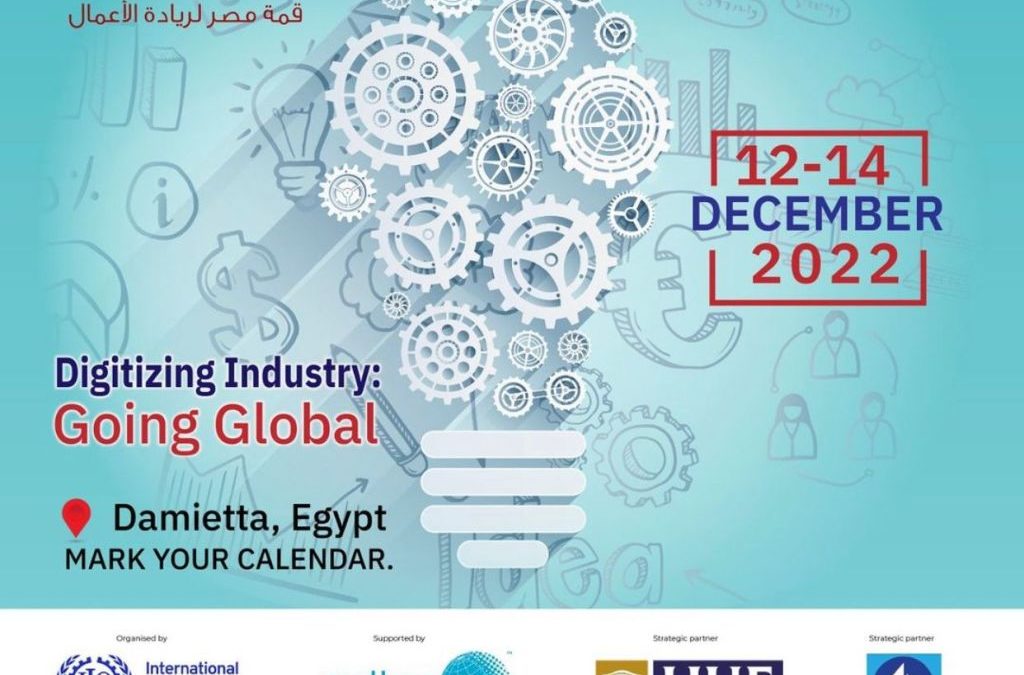
Egypt Entrepreneurship Summit 2022
Nov 2, 2022 | News | 1, The Latest
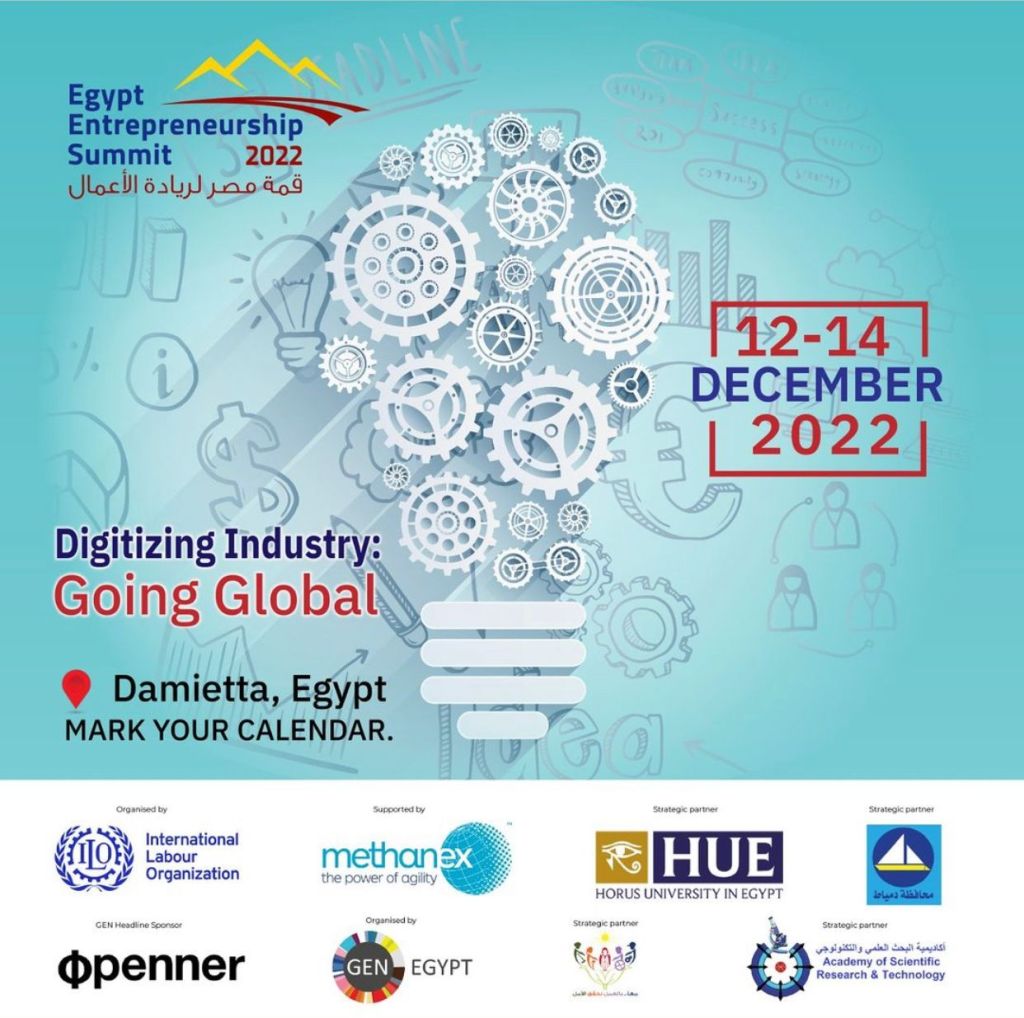
Article by: ICSB Office.
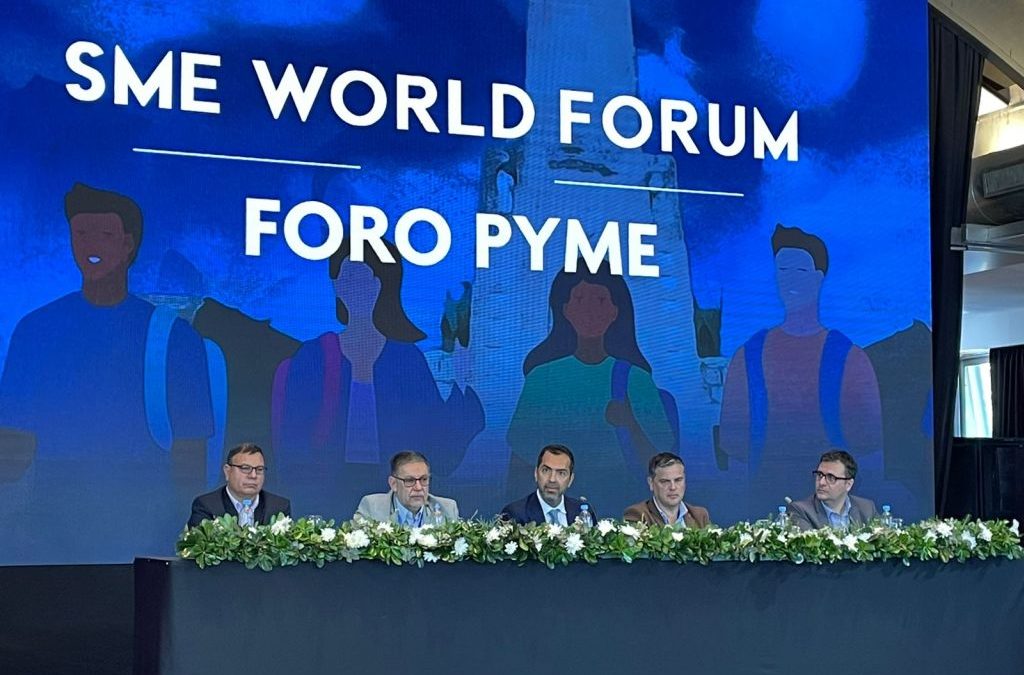
SME World Forum 2022
Oct 31, 2022 | News | 1, reflections, SME World Forum Site, The Latest, World Congress Site
SMEs Must Choose Change
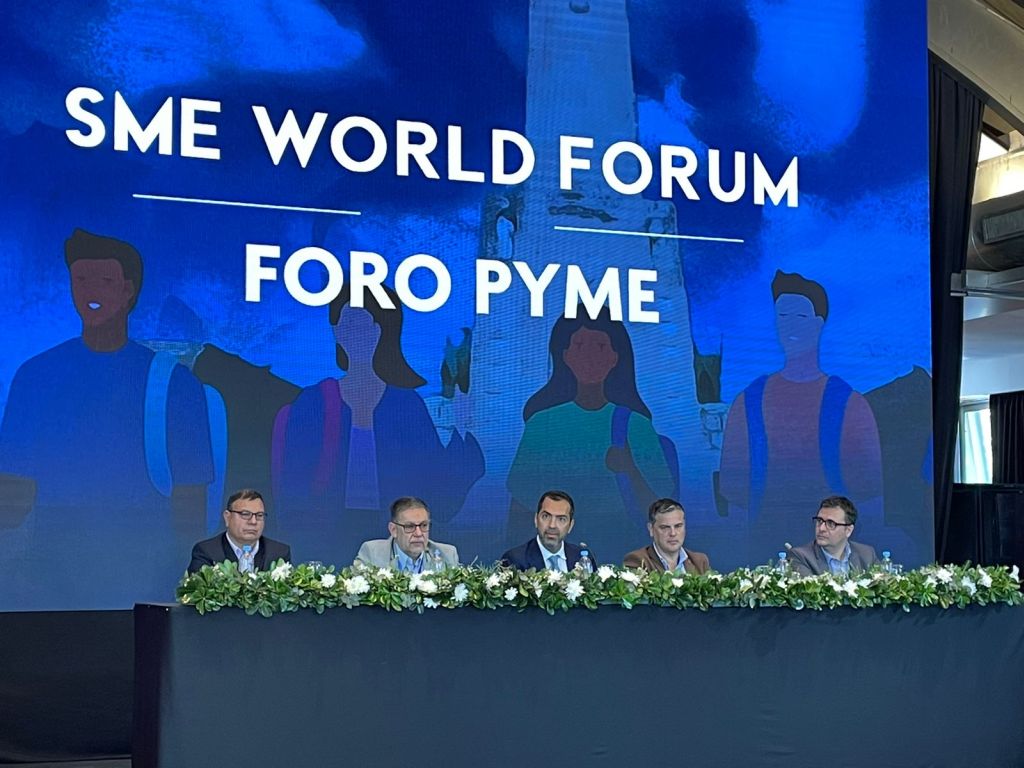
The Small and Medium-sized Enterprises World Forum (SME World Forum), in collaboration with the International Council of Small Business (ICSB), started today, October 31, 2022, in Rosario, Argentina.
The forum summons the world to a reunion of businessmen, small business owners, legislators, researchers, and educators, among other sectors to contribute with creative and innovative ideas worldwide. The Small and Medium-sized Enterprises World Forum’s opening will reunite some of the most creative and sympathetic world leaders of the academic and productive world. The National University of Rafaela, alongside The National University of Rosario and The Provincial Government of Santa Fe, will host this Forum from October 31st to November 2nd, 2022.
Article by: ICSB Office.







